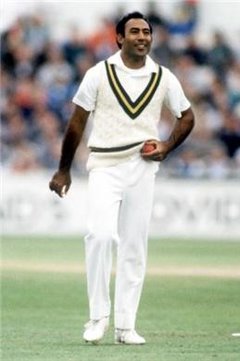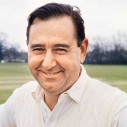The Hare and the Tortoise
David Taylor |
England’s tour to Pakistan in 1977-78 is not one that has lingered long in the memory. All three Tests were drawn, and both over-rates and scoring rates were, for the most part, tortuously slow. If the series is recalled at all it is for the injury to Mike Brearley that resulted in Geoff Boycott taking over as captain for the only time in his career – he led the side in the subsequent second leg in New Zealand, the emergence of Abdul Qadir as a leg-spin bowler of real potential and the awkward stand-off that occurred when the Pakistan selectors attempted to pick their Packer players for the final Test at Karachi (some ended up watching the game). Both sides were at less than full strength having lost players to World Series Cricket, but undoubtedly Pakistan were the more disadvantaged. For England Kent’s Derek Underwood and Bob Woolmer would have gone if available, and possibly Alan Knott (although he was starting to make known his dislike of touring), and Dennis Amiss might have been recalled on account of his previous success in Pakistan. The home side were missing almost all of their first-choice top order: Majid Khan, Zaheer Abbas, Asif Iqbal and Mushtaq Mohammad, who, along with Imran Khan, had all signed for Packer. As always happens in such circumstances though, it was an opportunity for lesser-known names to make an impact.
Although England’s three warm-up games did not go entirely smoothly – they were reduced to 64 for 9 in the opening match – the side was reasonably settled for the first Test at Lahore starting on 14 December. Geoff Cope was preferred to Phil Edmonds and made his debut, partnering fellow off-spinner Geoff Miller, while the conditions were never likely to suit Mike Hendrick or Ian Botham (the young all-rounder had met with little success and had been rather under-bowled). The two ‘rookies’ of the party, Mike Gatting and Paul Downton, were the other two omitted. Pakistan were playing their first Test since losing the WSC players. They recalled Shafiq Ahmad, a heavy scorer in domestic cricket who’d played one Test in England in 1974. Two younger batsmen would have been unfamiliar to English supporters: opener Mudassar Nazar and middle-order batsman Haroon Rashid. Both had made their debuts – in separate Tests – in Australia a year earlier and then been given an extended run in the side in the West Indies in early 1977. Wasim Bari captained the side and kept wicket, while left arm medium-pacer Liaqat Ali, a rather poor replacement for Imran, took the new ball with Sarfraz Nawaz.
Wasim Bari won the toss and, with three spinners in the side, unsurprisingly chose to bat. At the end of the day Pakistan had crawled to 164 for 2. Mudassar, like Haroon playing his first home Test, had batted right through the day for 52. The son of former Pakistan batsman Nazar Mohammed, who was now the national coach, he may have felt, as Alec Stewart did a few years later, that he had to dispel any suggestion of nepotism. At the other end Haroon, described by The Cricketer as a ‘strong and eager strokemaker’ had come in at the fall of Shafiq’s wicket and had made 84 out of 115 for the third wicket.
On day two the score advanced to 360 for 5. Haroon was the first to go, for 122, having shared in a partnership of 180 with Mudassar, then the best for Pakistan’s third wicket against England. Mudassar was still then well short of his hundred; when he reached 99 there was a premature invasion of the ground by celebrating spectators, which caused a minor riot when suppressed by police. Tea was taken while the ground was restored to order – as Wisden put it – ‘incredibly, the rioters voluntarily cleared the ground of debris.’ Eventually Mudassar reached his hundred, in nine hours and 17 minutes, the slowest on record – the previous mark having been set by Jackie McGlew for South Africa against Australia at Durban in 1957-58. Later in the day there was another disturbance when the wife of the jailed ex-Prime Minister, Mr Bhutto, came to the ground with her daughter Benazir, who had recently been elected president of the Oxford Union.
Pakistan’s innings lingered on into the third day before Bari called a halt at 407 for 9. For England Boycott’s response was to bat more than five hours for 63, setting the tone for the series much as Mudassar had done. Earlier his Yorkshire team-mate Cope had been deprived of a hat-trick on debut by the sportsmanship of his captain. Cope dismissed Qadir and Sarfraz with successive balls and had Liaqat given out caught by Brearley, but the England captain had the batsman recalled saying that the ball had not carried.
The match ended in a draw, hardly surprising as England’s innings lasted well into the final day with Miller making an unbeaten 98 and sharing in a vital partnership with Derbyshire team-mate Bob Taylor, himself playing only his second Test at the age of 36. The second Test at Hyderabad at least made it to a fourth innings, the highlights being another hundred by Haroon and six wickets by Qadir. Boycott made 100, his third hundred in five Tests since returning to the England side, as the match petered out. The last match at Karachi was another three innings affair, the bowling highlight this time coming from Edmonds, who’d been recalled in the previous match for his first Test since 1975. Brearley had gone home, having had his arm broken in a one-day match, and so didn’t see his Middlesex team-mate take 7 for 66.
With the Packer-contracted players still unavailable for the tour of England in 1978 (although Zaheer and Imran played full seasons for Gloucestershire and Sussex) Pakistan were still below strength and this time would not find conditions in their favour. The weather for much of the season was indifferent and England’s pace attack thrived. In addition Ian Botham, who had come of age with a maiden hundred in New Zealand, scored two more at a fast rate as well as blowing the visitors away at Lord’s with second-innings figures of 8 for 34, which would remain his career-best. Chris Old took 7 for 50 at Edgbaston including four wickets in five balls, while Bob Willis was at the centre of controversy when a short ball struck night-watchman Iqbal Qasim in the face (opener Sadiq wore a helmet, the first to be seen in a Test in England, but nobody thought to give one to Qasim – perhaps there wasn’t another available). All confidence gone, he didn’t make another run in the series. England won the first two Tests easily before Pakistan had the better of a rain-ruined third match.
And what of the tortoise and the hare? Mudassar managed only 86 runs in five innings (‘of pleasant disposition, he possessed a sound defence’ – Wisden) but showed a hitherto unknown ability as a medium-paced bowler. Although he took only eight wickets on the tour it was a sideline that would stand him in good stead four years later. Haroon was all at sea against the moving ball, managing just 33 runs in five innings and reaching double figures only once. The highlight of his series was a hooked 6 into the Mound Stand at Lord’s. He fared little better against the counties and only a knock of 78 against Surrey ensured his place for the third Test.
By the end of 1978 the WSC players were restored and both Mudassar and Haroon lost their place, although Mudassar’s exile lasted only one match as he replaced the unfortunate Sadiq for the second Test against India. From then on he was a regular selection at the top of the order, usually partnering Mohsin Khan, and was, surprisingly, a regular in one-day internationals where he often batted in the middle order. His bowling was a factor, clearly, as he was only the second Pakistan bowler, after Imran, to take 100 wickets in that format. He also played league and Minor Counties cricket in England and towards the end of his career was a regular in the end-of-season festival at Scarborough, and the ‘Rest of the World’ XI match against the tourists that is no longer played. Haroon was picked for Pakistan’s World Cup squad in England in 1979 despite his failures of the year before. He did a little better but still passed 20 only once, and that against Canada. After that he was in the wilderness until 1981-82, when with some players unavailable due to a contract dispute he was recalled against Sri Lanka. An innings of 153 got him another England tour but this time played only one Test, making one run. His last act as a Test player was to make a first-ball duck at Faisalabad before watching the next partnership add a world record 451. The batsmen were Javed Miandad and, of course, Mudassar, who both hit double centuries and career-best scores.
After retirement Mudassar went into coaching while Haroon served as a selector; he was once shot at, although I imagine that was due to some controversial selection rather than the inept way he dealt with England’s quicks in that grey summer of ’78. Without doubt the hare was outlasted and outperformed by the tortoise, but both answered the call when their nation needed them, and hopefully both have had good memories of their playing days to sustain them in retirement.





I remember listening to the Pakistan Tour on the radio. The tedium was only rarely punctuated – most notable when Henry Blofeld insisted that one of the batsman was Don Mosey. One point about the missing England Packer players. There’s no mention of Tony Greig who but for Packer would still have been captain. I believe Greig insisted on Mike Brearley being selected as vice captain for the India Tour in 1976/77 because he knew he wouldn’t be able to continue as captain having been so prominent in the World Series set up. There was no other logical reason why Brearley would have been selected as he was an average batsman and not particularly impressive against spin. Without World Series I think Fletcher would have been vice captain in India and they would never have made the scandalous decision to omit David Steele.
Comment by Lillian Thomson | 12:00am BST 5 April 2013
He was still selected in a fairly experimental ODI squad for the 3 matches against the West Indies at the end of the1976 summer. Whatever the reasoning he should have been straight back in the side for the First Test against Australia in 1977. Graham Barlow had done absolutely nothing on the winter tour to justify being selected. They even kept wheeling out Graham Roope who (God rest his soul) was not a Test batsman and by the winter had even chosen …………. drum roll……….. Clive Radley (who to be fair did quite well).
Comment by Lillian Thomson | 12:00am BST 5 April 2013
I can remember feeling, with many others, that Steele’s omission in 76/77 was a complete betrayal. I recall his debut very clearly when he came in after that horrible collapse and off just about his first delivery he tried to hook (I think it was off Thommo) and got a top edge that could easily have been the end. He settled down after that though, and what a hero he became. I really thought that those two 40s in the last Test against WIndies in ’76 were going to be enough to get him on the India trip and then another crack at the Aussies in ’77, but I suspect now his fate had been decided long before.
Comment by fredfertang | 12:00am BST 5 April 2013